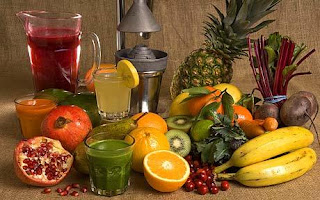Fresh fruit & vegetable juices
shows remarkable health-promoting properties and are being used by
naturopathys since long to help treat a range of ailments.
Freshly squeezed juices are naturally
full of vitamins, minerals and enzymes which are far better as
compare to synthetic tablets. The nutrients are easily absorbed into
the bloodstream and within ten minutes they nourish to body's cells.
Generally the juices are used in two ways:
- As a supplement to a normal diet- A typical supplementary juice up to 3 to 4 eight-ounce glasses per day, can be taken throughout the day.
- As a substitute for solid food (a "juice fast")- Juice therapists recommend juice-only fasts to cleanse and rejuvenate the body. Such fasts are also a good way to detect an unsuspected food allergy. They provide minimal calories and little fat or protein.
The following are some situations to
use Fruit & Vegetable Juices which defiantly gives possitive results.
For Diabetes :
Juice of bitter - gourd (Karela) is a
excellent remedy for Diabetes. A glassful of juice of fresh bitter -
gourd will bring down sugar content, improves digestion and also
removes constipation. If fresh leaves of maremoles is mixed (say
5-10 ml juice mixed with a glass of juice of bitter - gourd) it will
provide quicker relief. This should be continued for some period and
observe the blood sugar levels by having periodical tests. Once the
dose has been stabilized, its quantity should be adjusted as per
individual's requirement. The quantity may be raised or tapered
according to susceptibility of the case. A glassful of lime juice
should also be taken daily as a addition to it.
For Acne :
Generally, young persons (both male &
female) are often afflicted with acne. It is an agonizing skin
eruption (on face). Intake of mamelos, lime, papaya, cucumber juice,
is suggested . If impurity of blood be the reason then use in
additions to above blended juice, juice of margosa (neem) and also
apply paste of its young and green leaves. If irritation ensues or
persists discontinue use of margosa whether in local and/ or oral
form.
For Iron deficiency :
Juice of beet, spinach ,apple, carrot
and lime will make up the iron deficiency and enrich with increase
blood volume in the body. These fruits can be juiced together or
separately according to individual suitability convenience and
requirement.
For Arthritis :
Juice of lime orange, garlic, lemon,
margosa (neem), bitter gourd are used to overcome the symptoms of
arthritis.
For Heartburn :
Combination of Carrot (10oz), Beet
(3oz), Cucumber (3oz) are useful for Heartburn.
For Strengthening Muscles :
Muscle weaknesses are caused due to
exertion, inadequate blood flow, imbalance of calcium, sodium,
potassium or magnesium, lack of water, involuntary contraction.It is
recommended to use Juice of beet, celery, carrot, supply
sodium, watercress, Green Cabbage .Calcium, magnesium is supplied by
parsley and collard greens, Carrot and Cabbage supply potassium ;
spinach, asparagus and carrot supply vitamin 'E', and vitamin 'C' is
supplied by Red pepper, Collard green and Cabbage(green).
For detox :
Wheatgrass juice has been proved over
many years to benefit people in numerous ways: cleansing the lymph
system, building the blood, restoring balance in the body, removing
toxic metals from the cells, nourishing the liver and kidneys and
restoring vitality. Wheatgrass Juice is a superior detoxification
agent compared to other fruits and vegetables- Start with one ounce
a day with a small amount of water. As you become familiar stop the
water and work up to 6 ounces of wheatgrass juice a day. Your energy
level will be very high. Drink slowly one hour before meals.
Wheatgrass juice is a powerful cleanser and may cause nausea, through
starting an immediate reaction with toxins and mucus in the stomach.
For managing menopausal symptoms :
Carrot , Beet , Lettuce , Turnip juice
is beneficial in managing menopausal symptoms. Pomegranate or Cucumber juice can also be used in
combination with beet and carrot juice.
Precautions :
Certain precautions are , necessary in
adopting an exclusive diet of raw juices.
All juices should be made fresh
immediately before drinking. Canned and frozen juices should not be
used.
Only fresh ripe fruits and vegetables,
preferably organically grown, should be used for extraction of
juices.
Extract only as much juice is needed
for immediate consumption. Raw juices oxidise rapidly and lose their
medicinal value in storage, even under refrigeration.
The quality of the juices will affect
on their results. In case of incomplete extraction of juices, their
effective power is proportionately reduces due to the absence of the
vitamins and enzymes which are left behind in fiber and the pulp.
If the juices are too sweet , they
should be diluted in water on 50 : 50 basis or mixed with other less
sweet juices. This is especially important in some specific
conditions like diabetes, hypoglycemia, arthritis and high blood
pressure.

